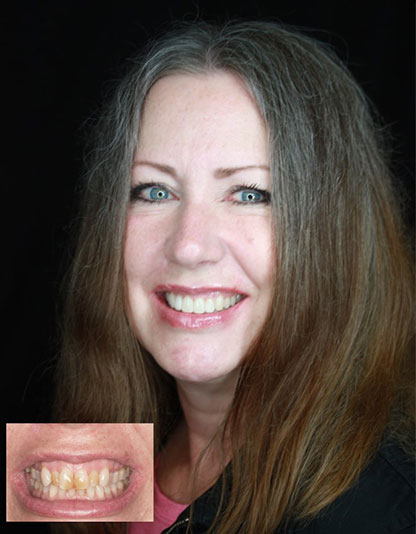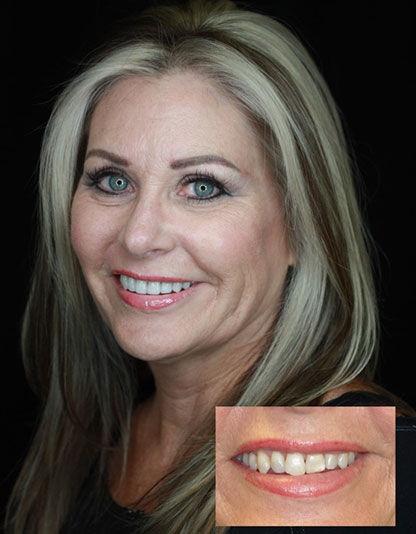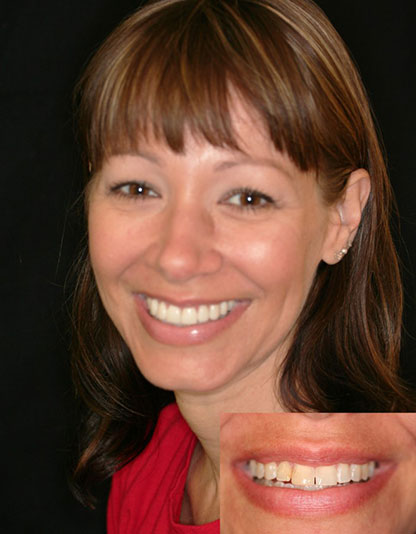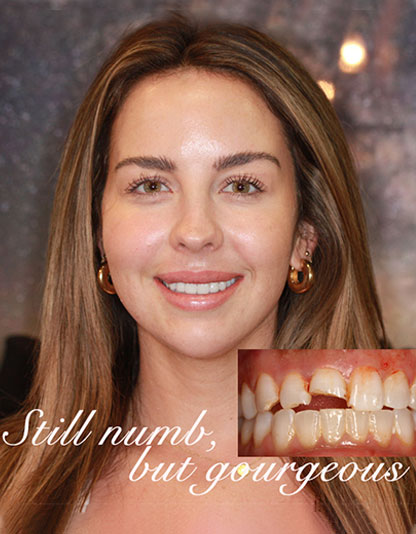Contents: What are Porcelain Veneers? | Procedure | When To Use? | Advantages & Limitations | Aftercare | How much cost? | Appointment | FAQ
What is a Porcelain Veneer?
Best Veneers Dentist – Dental veneers are wafer-thin shells or laminates commonly made from porcelain or resin composites to cover imperfections in the teeth. The correct dental terms for veneers include dental laminates, ceramic sheaths, or porcelain sheaths.
Veneers are less than half a millimeter thick, making them nearly invisible. They are applied by removing an equal thickness of enamel, so they sit flush with the natural teeth. Porcelain veneers provide a translucent appearance, reflecting the natural enamel of the teeth. However, porcelain is a brittle material and relies on tooth enamel for strength and durability.
Even though removing enamel may seem uncomfortable, the application process is generally safe and painless. Patients may experience mild tooth sensitivity for a few weeks due to enamel trimming.

When Are Veneers Used?
Cosmetic dentistry treatments like veneers improve the appearance of the teeth and are usually applied to the front teeth. Veneers are not recommended for molars, as they are not directly visible and do not replace missing teeth—dental implants are a better option for that.
Meet Our Team
Michael Ayzin Dentist DDS
Ronald Ayzin Dentist DDS
Soo Kwon Dentist DMD
Sona Bekmezian Orthodontist DMD
Javier Mejia Orthodontist DDS
Salman Hussain Anesthesiologist
How Are Veneers Applied?
Applying veneers is more complex than dental bonding and consists of three steps:
- 1. Consultation
- 2. Preparation
- 3. Application
The entire process usually takes two to three visits, depending on whether a separate consultation is needed.
Step 1: Consultation & Planning
During the first visit, the dentist and patient discuss:
- Oral health concerns
- Aesthetic goals
- Cosmetic/restorative options
- Cost of treatment
Step 2: Mouth Preparation & Impression Creation
Preparation of the Mouth
- A thin layer of enamel is removed to match the thickness of the veneer.
- Composite veneers require more enamel removal than porcelain veneers.
- Gums may become slightly bruised, causing mild discomfort for a few days.
- If the tooth is chipped, it may need restoration before veneer placement.
Step 3: Veneer Application
- Teeth are polished, cleaned, and chemically etched to roughen the surface, improving bonding.
- A transparent or opaque bonding material is used to secure the veneers.
- The patient is asked to bite down and ensure a comfortable fit.
Creating Impressions
- Once the teeth are prepared, impressions are taken.
- These are sent to a dental lab to create the custom veneers based on the selected material and color.
- The process typically takes 10+ days, allowing gum healing before placement.
Learn about gapped teeth.
See Results






When Should Veneers Be Used?
Veneers are primarily cosmetic and used in cases such as:
- Tooth discoloration – Caused by smoking, poor oral hygiene, alcohol, excess fluoride, drug use, gastric reflux, or root canal treatment.
- Worn teeth – Teeth naturally wear over time due to genetics, poor oral hygiene, or conditions like diabetes.
- Chipped or cracked teeth – Veneers hide chips and cracks, restoring the tooth’s natural appearance.
- Gaps between teeth – Small or large gaps can be closed with veneers.
- Irregularly shaped or misaligned teeth – Uneven teeth, varying heights, widths, or surface imperfections can be corrected.
Advantages & Limitations of Veneers
Advantages:
- Restores a natural appearance
- Porcelain veneers are stain-resistant and compatible with gum tissue
- Available in various shades, even for severely discolored teeth
- Requires less tooth shaping compared to dental crowns
- No bone loss is required for the procedure
- Metal-free
Limitations:
- Requires removal of enamel, which cannot be restored
- More expensive than other cosmetic procedures
- May cause temporary tooth sensitivity
- Veneer color cannot be changed (whitening must be done beforehand)
- Rare cases of veneer detachment or damage from hard foods
- If tooth decay occurs, the veneer may need to be replaced with a crown
When Are Veneers Not Recommended?
Veneers are not suitable for patients with:
- Severe tooth decay
- Fractures, gum infections, or large fillings
- Thin enamel
- Teeth grinding (bruxism), as this can damage veneers


Veneer Aftercare
Veneer placement is pain-free, but local anesthesia is used during preparation.
- If pain occurs post-procedure, over-the-counter pain relief can be taken.
- Teeth may remain sensitive for a few weeks, especially to hot or cold foods.
- Oral hygiene is crucial – continue brushing, flossing, and using mouthwash.
Cost of Dental Veneers
Cost of Veneers more than other cosmetic dentistry options but are less expensive than braces.
Estimated Veneer Costs:
- Porcelain veneers: $925 – $2,500 per tooth
- Composite/resin veneers: $250 – $1,500 per tooth
Most dental insurance plans do not cover veneers, as they are considered cosmetic procedures.
- Porcelain veneers last 10–15 years
- Composite veneers last 5–7 years
Learn about abnormal eruption. More on Underbites and Overbite.
(Source: Consumer Guide to Dentistry)

Porcelain Veneers in Costa Mesa, CA
If you have questions about dental veneers, treatment options, or insurance coverage, schedule an appointment with Dentistry At Its Finest.
Before and After Pics of Veneer | Dentistry At Its Finest in Costa Mesa
Veneers FAQ
Are veneers permanent?
No. Veneers must be replaced every 10–15 years. A thin enamel layer is removed before application. See what Dr. Michael Ayzin, DDS has to say about veneers.
Are veneers painful?
No. The procedure is pain-free, and local anesthesia is used. When the anethesia wears off, most patients at Dentistry At It’s Finest are experiencing little to no pain after the procedure. Although sensitivity is normal after the treatment, it will go away in a few days.
Do teeth decay under veneers?
Proper brushing, flossing, and regular dental checkups are needed to prevent cavities around veneers.
Visit our Dentistry At Its Finest office to learn more about veneers aftercare.
Do veneers ruin teeth?
No. The bonding materials are non-toxic and do not harm teeth.
What foods should I avoid with veneers?
-
Chewing ice
-
Acidic foods and drinks (weaken bonding)
-
Sticky candies
-
Hard foods (nuts, pretzels, etc.)
-
Excessive alcohol consumption (affects bonding)
-
Staining beverages (for composite veneers)
Can I bite into apples with veneers?
No. Hard foods can damage veneers. Cut apples into slices and chew with back teeth.
Can I drink coffee with veneers?
Yes. Porcelain veneers are stain-resistant, but composite veneers may stain over time.
Why do people get veneers?
To achieve a whiter smile, cover chips or misshapen teeth, close gaps, and correct alignment issues.
Affordable Dental Veneers Near Me
Choosing a nearby dentist is important for follow-up visits and routine care. Look for a specialist with excellent reviews and one you trust.
Call Dentistry At Its Finest at (714) 540-5511 to book your veneer consultation.
